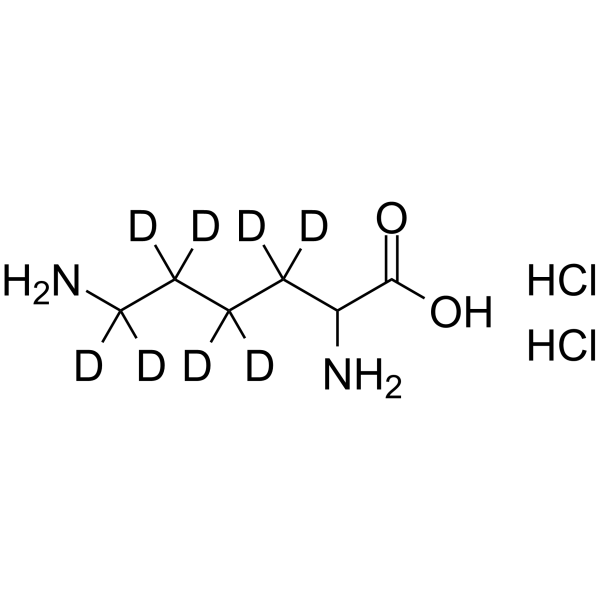DL-Lysine-d8 dihydrochloride
Modify Date: 2024-01-09 18:23:55

DL-Lysine-d8 dihydrochloride structure
|
Common Name | DL-Lysine-d8 dihydrochloride | ||
|---|---|---|---|---|
| CAS Number | 284664-87-5 | Molecular Weight | 227.16 | |
| Density | N/A | Boiling Point | 369.8ºC at 760 mmHg | |
| Molecular Formula | C6H8D8Cl2N2O2 | Melting Point | 200-206ºC | |
| MSDS | USA | Flash Point | 177.4ºC | |
Use of DL-Lysine-d8 dihydrochlorideDL-Lysine-d8 dihydrochloride is the deuterium labeled DL-Lysine[1]. |
| Name | 2,6-diamino-3,3,4,4,5,5,6,6-octadeuteriohexanoic acid,dihydrochloride |
|---|---|
| Synonym | More Synonyms |
| Description | DL-Lysine-d8 dihydrochloride is the deuterium labeled DL-Lysine[1]. |
|---|---|
| Related Catalog | |
| In Vitro | Stable heavy isotopes of hydrogen, carbon, and other elements have been incorporated into drug molecules, largely as tracers for quantitation during the drug development process. Deuteration has gained attention because of its potential to affect the pharmacokinetic and metabolic profiles of drugs[1]. |
| References |
| Boiling Point | 369.8ºC at 760 mmHg |
|---|---|
| Melting Point | 200-206ºC |
| Molecular Formula | C6H8D8Cl2N2O2 |
| Molecular Weight | 227.16 |
| Flash Point | 177.4ºC |
| Exact Mass | 226.10900 |
| PSA | 89.34000 |
| LogP | 2.53190 |
| Vapour Pressure | 1.75E-06mmHg at 25°C |
| RIDADR | NONH for all modes of transport |
|---|
| MFCD01321406 |
| DL-Lysine-3,3,4,4,5,5,6,6-d8 dihydrochloride |